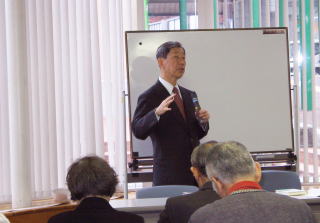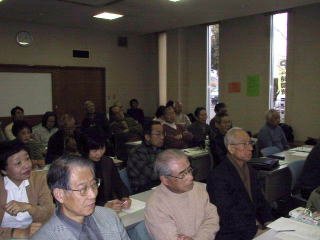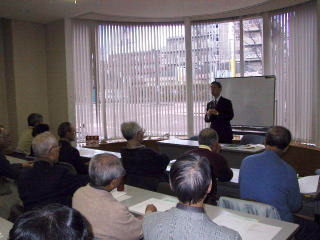![]() @
@
@ This speech was held on January 15, a clear and arid day after a stormy
and rainy evening. The conference room was at near capacity. The speaker
was Prof. M. Ikei, famous as a skilled reviewer of Major league baseball
games.

Japan had successively waged two wars against
the then major powers, China and Russia within 40 years after it restored its
imperial government.
> At the time when the war broke out, very few western citizens believed
in Japan securing a victory. To the contrary, Japanese people were agitated
by the strong opinion held by newspapers. Those Japanese were very
patriotic, and enthusiastic to see off the Foreign Affairs Minister J.
Komura who was attending a Peace Treaty Conference in Portsmouth
>
> H. Ito, former Prime Minister, said to Komura, gWhen you leave for Portsmouth, there will be so many people
to see you off, so I will not do so. But when you return, I am afraid
there will be no one to welcome you back, therefore I will welcome you.h
>
> Professor Ikei pointed out four reasons why Japan defeated Russia. They
are as follows:
> (1) Cooperation with England and the United States was already
secured.
> (2) There was harmony between the Japanese strategy and its politics.
> (3) There was a difference in the quality of weapons used and
thesoldiers' fighting spirit.
> (4) Russia had a threat of revolution in their home country.
>
> He also summarized four points of what the victory brought to Japan:
>
> (1) There was a big misunderstanding among Japanese people that
Japan earned an overwhelming victory over Russia.
> (2) Japanese people tended to think they had became a world power.
> (3) The Japan-US relationship started to decline.
> (4) Korea was absorbed by Japan
.
> By comparing the reasons and results of this victory we clearly notice that there are great lessons to be learned...
This speech was made quite persuasively,
complimented with examples throughout the
> Q&A session which lasted about an hour.
>
 @
@